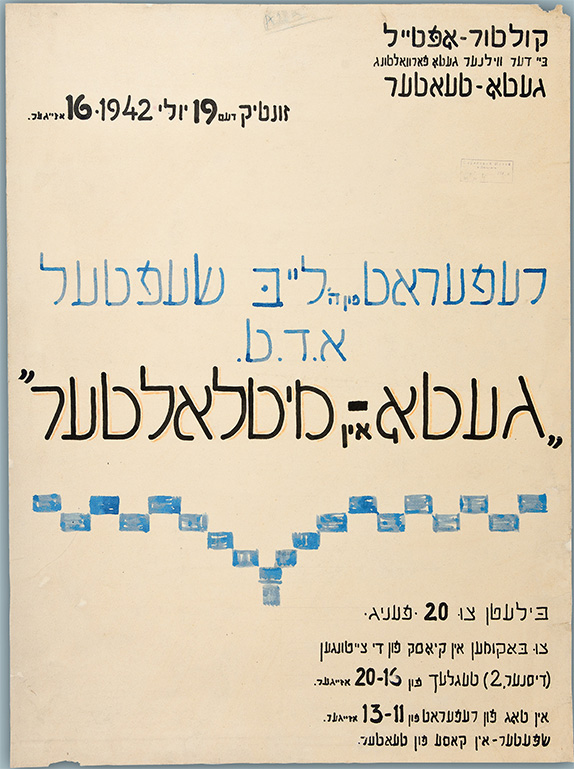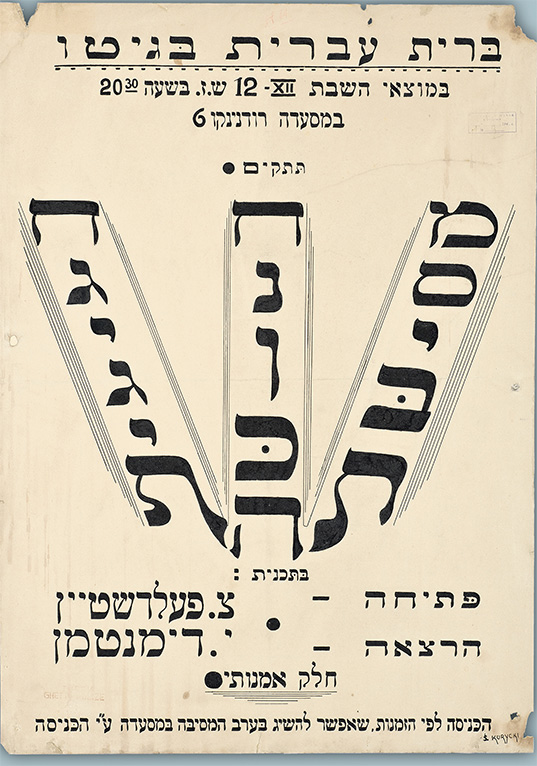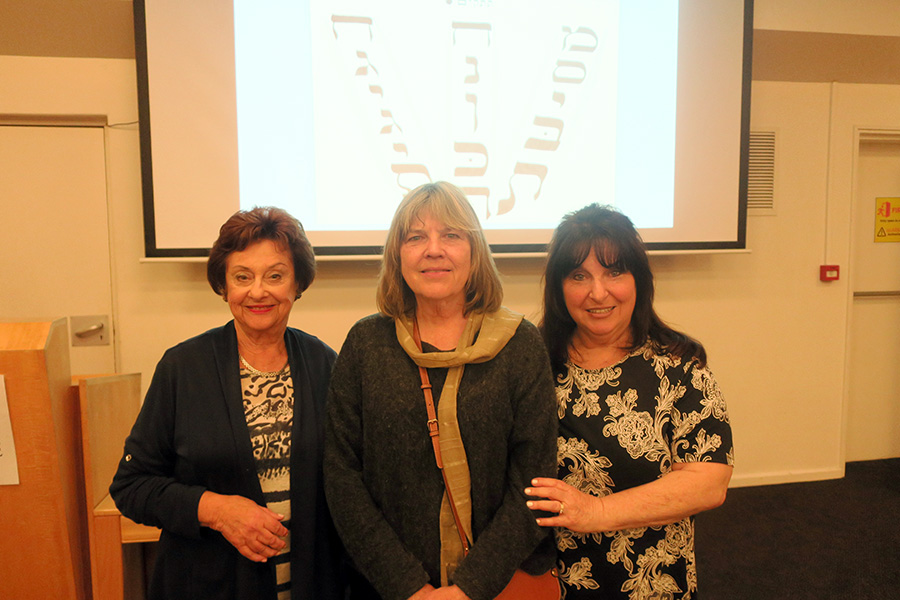CJC staff reporter
2023 marks the 80th anniversary of the liquidation of the Vilna Ghetto.
On Tuesday 7 February, The Cape Town Holocaust and Genocide Centre, in partnership with the Embassy of Lithuania hosted the opening of an exhibition of the Vilna Gaon State Museum’s collection of archival posters from the Vilna Ghetto. This is the first of a number of events scheduled for 2023 to mark this anniversary.
The exhibition consists of copies of the hand-drawn and painted posters which advertised the cultural events in the Ghetto including discussions on scientific subjects including medicine, university level courses, theatre productions and music evenings. One poster even advertises an event to mark the 100 000th book to be borrowed from the ghetto library!
These posters survived and were found in the area of the ghetto after the war. They bear silent witness to the the incredible cultural life that residents of the Vilna Ghetto developed in a very short period of time, despite the overwhelmingly dark and uncertain times in which they were living.
“For me they are silent witnesses, yet they speak so eloquently of creativity, hope and resilience. They are tragic reminders of what could have been. They are intimate and demand that we engage with them on many levels: In terms of their remarkable execution at a time when paints and paper were hard to come by, what they say about the people they were made for and for the what they represent in terms of the spirit of the time and the context in which they were created.” Richard Freedman.
Special guest for the evening was Zola Shuman. Born in Cape Town, Zola is a singer-songwriter, composer, performance coach, creative content consultant and performing artist.
Both of Zola’s parents were born in pre-war Vilna and miraculously survived the Holocaust. Her mother, Chayela and her uncle Leyb Rosenthal (who did not survive the war) were deeply involved in the cultural life of the Ghetto, and feature in a number of the posters on display.
Zola made a documentary about her mother and uncle, which was screened at the event.
CTHGC chairman Richard Freedman contextualised the exhibition
“After a year of Soviet occupation of Lithuania, the treaty between the Soviet Union and the Nazi Government collapsed and was followed almost immediately by the invasion of the Baltic States in June 1941.
What ensued was a disaster for the Jewish population of the region. Lithuanian nationalists under the protection of the Nazis began killing the Jews across Lithuania. Vilna was no exception. The killing of the Jews of Vilna was conducted in the Ponary forests some 10km from Vilna. This was to all intents and purposes the beginning of the Nazi final solution for the Jews of Europe. Of the 56 000 Jewish inhabitants of Vilna, only about 18 000 souls were still alive after six months; and the thriving intellectual, artistic and historical Jewish community of what was known for hundreds of years as the Jerusalem of Lithuania was all but destroyed. The surviving Jews were forced into a small area of the city in what became known as the Vilna Ghetto.
Like in the other ghettos established across Europe, residents tried to survive in overcrowded conditions on starvation rations. Disease and malnutrition became a daily challenge and took their toll. They were faced with the fear of impending destruction, having all lost family and friends in the preceding months. In most ghettos, schools and religious practice were forbidden. It was forbidden to give birth and pregnant women were forced to end their pregnancies. The ghetto was in effect a prison camp with heavily controlled access and little or no contact with the city beyond the walls and confines of the ghetto. One can only imagine the despair and sense of desperation that the ghetto inhabitants experienced. Yet the response to these appalling conditions was astonishing.”
HE Mr Dainius Junevičius Ambassador of the Republic of Lithuania shared some reflections on the Holocaust remembrance in Lithuania
“Every year Lithuania joins people worldwide in remembering the six million Jews who were brutally murdered during the Holocaust. The tragedy that started over 80 years ago still casts its shadow over all Lithuanian cities and towns. The Nazis and their Lithuanian collaborators erased the entire vibrant layer of our society, destroying the unique Lithuanian Jewish culture and, most importantly, innocent human lives.
“As we pay respect to the 200 000 Lithuanian Jews, our compatriots, lost for our country, I want to ensure you that Lithuania continues to remember and reflect on what has happened and why it happened. The pledges we are making to never forget the Holocaust translate into concrete actions targeting a wider society, but first of all, the younger generation.
“In Lithuania, a member country of the International Holocaust Remembrance Alliance since 2002, the history of the Holocaust is being taught in schools (teachers are using recommendations on teaching and learning about the Holocaust, prepared by the IHRA and translated into Lithuanian), and more than 150 Tolerance Education Centres have been set up in secondary schools with the help of Yad Vashem and the International Commission for the evaluation of the crimes of the Nazi occupation in Lithuania.
“Lithuania doesn’t tolerate any form of antisemitism, Holocaust denial and distortion that find sophisticated forms today, especially in the digital space. In this spirit, I want to invite you to Lithuania to explore your roots. I hope that you and the Litvak diaspora all over the world will walk forward with us in friendship and partnership, drawing from our shared history to advance the cause of Tikkun Olam.”
The exhibition will run until the end of March.
Sunday – Thursday 10am-5pm; Friday 10am – 5pm; Saturday closed



• Published in the March 2023 Digital Edition – Click here to start reading.
• To advertise in the Cape Jewish Chronicle and on this website – kindly contact Lynette Roodt on 021 464 6736 or email advertising@ctjc.co.za. For more information and advertising rate card click here.
• Sign up for our newsletter and never miss another issue.
• Please support the Cape Jewish Chronicle with a voluntary Subscription for 2023. For payment info click here.
• Visit our Portal to the Jewish Community to see a list of all the Jewish organisations in Cape Town with links to their websites.
Follow the Cape Jewish Chronicle: Facebook | Instagram | Twitter | LinkedIn










